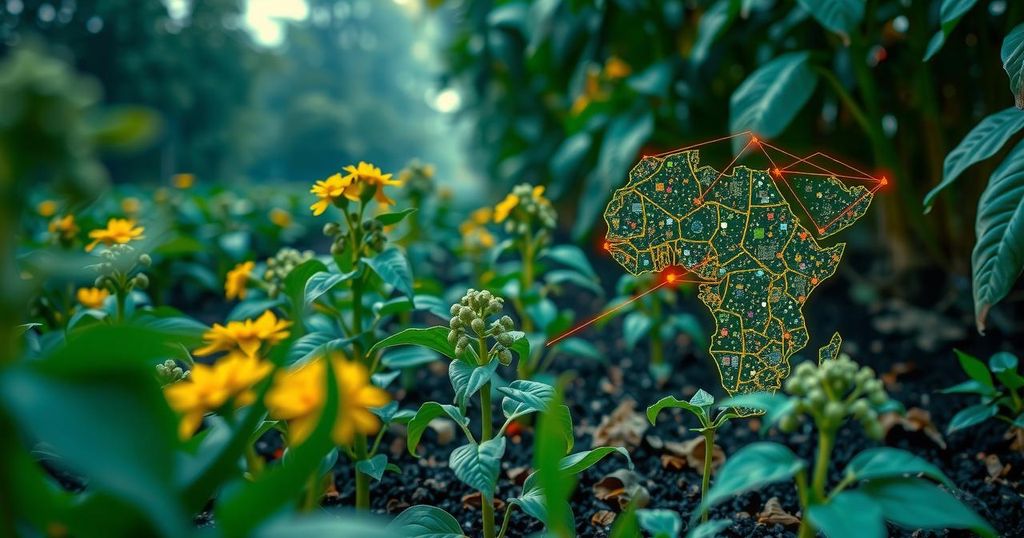COP29 will focus on the intersection of climate change, land use, and nutrition, emphasizing technological advancements in agriculture. Plant biotechnologists advocate for the use of artificial intelligence to enhance crop resilience while ensuring that such innovations do not fall under the purview of large corporations. African governments are urged to promote equitable access and support for food security initiatives tailored to vulnerable populations across the continent.
The forthcoming COP29 annual global climate change conference will spotlight the intersection of land use and food production as they pertain to an ever-growing global population, particularly amid climate change challenges. As delegates gather in November, they will seek to explore innovative technologies aimed at fostering climate resilience within agricultural and food production systems. Critical questions to be addressed will encompass effective utilization of technology to ensure nutrition amidst climate challenges while concurrently mitigating the environmental impact of the food production sector. As a plant biotechnologist actively engaged in identifying and propagating plant species with superior genetic attributes, I focus on enhancing food security and conservation in this climate-altered landscape. Our teams prioritize the preservation of climate-resilient genes, which include endangered tree species and valuable indigenous African leafy vegetables. Some conventional methodologies employed by plant biotechnologists include the cryopreservation of germplasm and the maintenance of plant tissue cultures. We have devised breeding programs that yield crops which boast increased resistance, extended longevity, and enhanced nutritional profiles. With advancements in biotechnology, gene modification and editing techniques now enable us to bolster plant resilience against pests. However, it is the domain of artificial intelligence that presents a transformative potential, empowering us to tackle complex agricultural challenges by utilizing machine learning algorithms. This technological progress facilitates the identification of desirable plant traits, thereby enabling the development of resilient crops suited for diverse climatic conditions. The potential of artificial intelligence in agriculture extends across three pivotal dimensions: the capacity to analyze vast and diverse datasets related to soil and climatic conditions; the ability to automate and optimize agricultural processes, such as resource utilization; and the opportunity to make real-time, data-driven decisions through continuous monitoring and feedback mechanisms. Moreover, artificial intelligence has unlocked significant advancements in our understanding of protein structures, which are fundamental to food production. Notably, the recent achievements in protein chemistry—acknowledged with the Nobel Prize in Chemistry—highlight the efficacy of AI platforms like AlphaFold in elucidating the complexities of protein structures. This groundbreaking understanding has allowed scientists to engineer novel proteins that enhance food security across an array of applications. Nevertheless, the unequal global distribution of artificial intelligence resources, coupled with varying levels of investment, has resulted in a disparity in access and innovation, particularly within Africa. As the continent contemplates the implications of population growth on food security, it finds itself at a critical juncture, lagging in technological advancements necessary for modern food production. The urgency of addressing these disparities at COP29 cannot be overstated. African governments must champion the narrative that the advancement of artificial intelligence in relation to food security must consider the needs of the most disadvantaged populations. It is imperative that these technologies not be controlled solely by major corporate interests, given their historical track record concerning monopolistic practices and inequitable resource distribution. African nations are encouraged to drive their own innovation initiatives, attract necessary investments, and cultivate climate resilience through homegrown artificial intelligence applications tailored to the continent’s unique agricultural contexts. The emphasis of COP29 must therefore be on ensuring that as artificial intelligence enhances global food systems, it concurrently identifies and supports vulnerable demographics, promoting equitable access to the bounty generated by improved agricultural technologies.
The narrative surrounding climate change and agriculture has gained prominence in recent years, particularly regarding strategies to sustain food security amidst evolving climatic conditions. The COP29 conference seeks to examine the role emerging technologies play in enabling agricultural resilience and nutritional security. Plant biotechnologists leverage scientific advancements to enhance crop resilience, while artificial intelligence promises to revolutionize agricultural practices by streamlining processes and improving decision-making. However, inequitable access to such technologies underscores a pressing need for governance and advocacy to ensure ethical distribution and utilization of agricultural innovations.
The discourse surrounding COP29 reinforces the necessity for forward-thinking approaches to harness artificial intelligence for enhancing global food security and agricultural resilience. The recommendations put forth advocate for equitable access to technological advancements, calling for African governments to prioritize the needs of the disadvantaged populations. Ensuring ethical application and distribution of innovations will be crucial in addressing the multifaceted challenges posed by climate change to food production systems, thereby promoting sustainability and equity in resource utilization.
Original Source: theconversation.com






